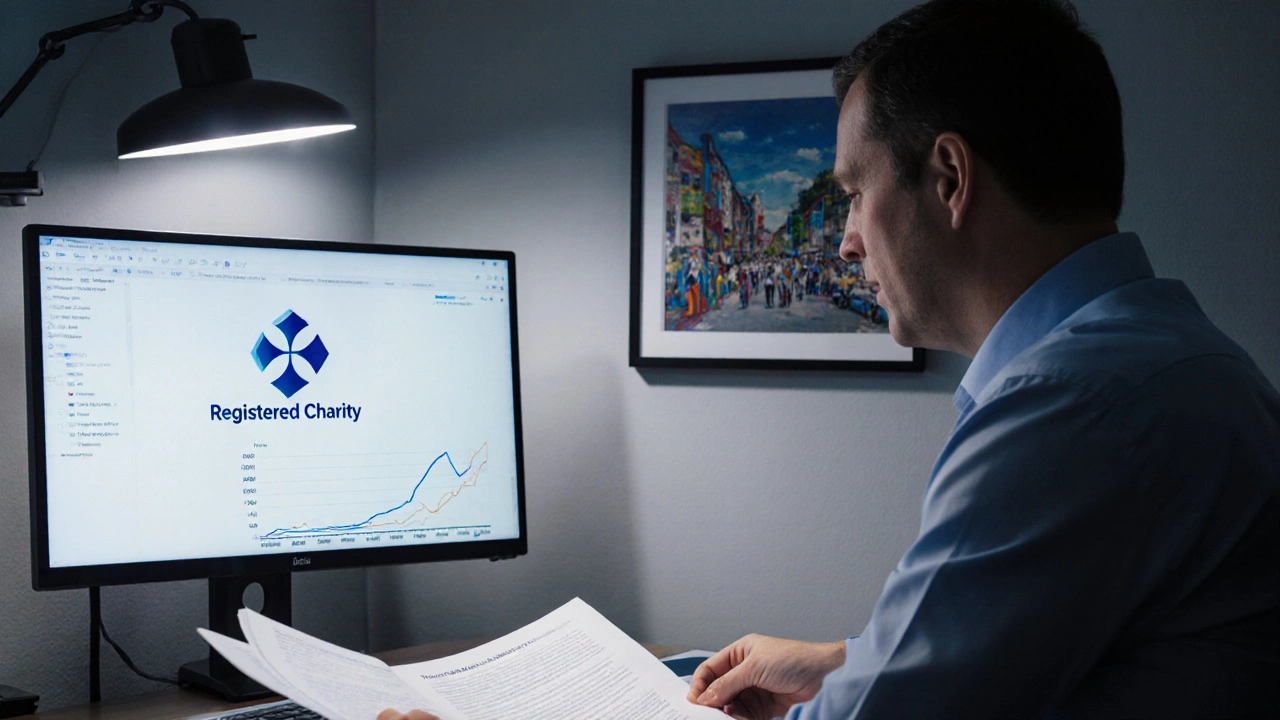Charitable Trust Tax Calculator
Calculate Your Tax Savings
This calculator estimates the potential capital gains tax savings when donating appreciated assets through a charitable trust instead of selling them directly.
Potential Tax Savings
Enter your asset details to see your potential tax savings.
Note: This calculator provides an estimate. Actual tax savings may vary based on specific circumstances. Consult a tax professional for personalized advice.
A charitable trust isn’t just a legal document-it’s a powerful tool that lets people give money or property to help others, while keeping control over how that help is used. If you’ve ever wondered how someone can donate a house, shares, or a large sum of cash to a cause and make sure it keeps helping year after year, a charitable trust is often how they do it.
What exactly is a charitable trust?
A charitable trust is a legal arrangement where someone (called the donor or settlor) gives assets-like cash, real estate, stocks, or even artwork-to a trust. That trust then uses those assets to support a charitable cause, like helping homeless families, funding education, or protecting the environment. The trust is managed by one or more trustees, who are legally required to follow the donor’s instructions and use the money or property only for the stated charitable purpose.
Unlike simply writing a check to a charity, a charitable trust lets you set rules. Maybe you want your donation to support youth programs in Wellington for the next 20 years. Or maybe you want the income from your shares to go to an animal shelter every year, while the original shares stay intact. That’s the flexibility a charitable trust gives you.
In New Zealand, charitable trusts must be registered with the Charities Register. This means they’re officially recognized as doing good work and are eligible for tax benefits. To qualify, the trust must have purposes that are clearly charitable-like relieving poverty, advancing education, or protecting the environment. It can’t be set up to benefit a specific person or a political group.
How does a charitable trust work?
Setting up a charitable trust is a three-step process: give, manage, distribute.
First, you give assets to the trust. This could be $50,000 in cash, a piece of land, or even a portfolio of shares. Once those assets are transferred, they legally belong to the trust-not to you anymore. You can’t take them back.
Second, trustees take over. These are people you choose (or sometimes a professional firm) who are responsible for managing the trust’s money and property. They have to act in the best interest of the charity, not themselves. They can invest the money, rent out property, or sell assets if it helps the trust grow or meet its goals.
Third, the trust distributes funds to the charity or charities you named. This can happen in two main ways:
- Charitable Remainder Trust: The trust pays income to you (or someone else) for a set time-like 10 years-then gives the rest to charity. This is useful if you want to keep some income during your lifetime but still leave a legacy.
- Charitable Lead Trust: The trust gives income to charity first, then passes the remaining assets to your family or heirs after a set period. This is often used to reduce estate taxes while still supporting a cause.
For example, if you set up a charitable remainder trust with $200,000 in shares, the trust might pay you 5% a year ($10,000) for 15 years. After that, the remaining value-say $250,000 after growth-goes to a local food bank. You get income now, the charity gets a big gift later.
Why choose a charitable trust over just donating?
Many people think, “Why not just give the money directly to the charity?” The answer is control, tax benefits, and long-term impact.
When you donate directly, the charity gets the money and can spend it however they want. With a charitable trust, you decide how the money is used. You can say, “Only fund after-school programs,” or “Must support Māori youth in the lower North Island.” That level of specificity isn’t possible with a one-time donation.
Tax-wise, charitable trusts in New Zealand are exempt from income tax on investment earnings. If you donate appreciated assets-like shares that have gone up in value-you avoid paying capital gains tax on the increase. That means more money goes to the cause.
Also, if you’re planning your estate, a charitable trust can reduce the size of your taxable estate. That means your heirs might pay less in inheritance taxes. It’s a way to give back and still protect your family’s future.
Who manages a charitable trust?
Trustees are the backbone of any charitable trust. They’re not just administrators-they’re legal guardians of your intent. You can name family members, friends, or professionals like lawyers or accountants. Many people choose a mix: one trusted person who knows your values, and one professional who understands the law.
Trustees have three main duties:
- Follow the trust deed: They must do exactly what you wrote in the trust document. No exceptions.
- Act in the charity’s best interest: They can’t use trust money for personal gain. Even buying a coffee with trust funds is a breach.
- Keep good records: They must track every dollar in and out, file annual reports, and make sure the trust stays registered with Charities Services.
It’s a big responsibility. That’s why many people choose to appoint a professional trustee-like a bank’s trust department or a nonprofit trust company. They charge a small fee, but they bring experience and reliability.

What kinds of assets can go into a charitable trust?
You can put almost anything into a charitable trust:
- Cash
- Real estate (homes, land, commercial buildings)
- Shares and stocks
- Retirement accounts (in some cases)
- Art, jewelry, or collectibles
- Intellectual property (like royalties from a book or song)
Some assets are easier than others. Cash is simple. Real estate might need a valuation and legal transfer. Shares need to be sold or transferred through a broker. Art and collectibles often require an independent appraisal to set their value for tax purposes.
One common mistake people make is donating an asset with debt attached-like a house with a mortgage. That can create problems. The trust has to pay off the debt before it can use the property. Always talk to a lawyer before putting property with loans into a trust.
What are the downsides?
Charitable trusts aren’t perfect. They’re not for everyone.
First, they’re expensive to set up. Legal fees for drafting a trust deed can range from $2,000 to $5,000 in New Zealand. You’ll also pay ongoing fees if you use a professional trustee.
Second, they’re permanent. Once you give the assets away, you can’t take them back. If your financial situation changes-say you lose your job or get sick-you can’t reclaim the money.
Third, they take time to manage. Trustees must file annual reports, keep records, and sometimes deal with complex tax rules. If you don’t have someone reliable to manage it, the trust can become a burden.
And finally, if the charity you chose stops operating or changes direction, your trust might not be able to adapt easily. That’s why many people name multiple charities or include a “cy-près” clause-a legal safety net that lets a court redirect funds to a similar cause if the original one no longer exists.
How do you start one?
Here’s a simple roadmap:
- Decide what cause you want to support. Be specific. “Helping kids” is too vague. “Funding after-school tutoring for low-income students in Porirua” is better.
- Choose your assets. What are you giving? Cash? Property? Stocks?
- Select your trustees. Who will manage the trust? One person? A team? A professional?
- Write the trust deed. This is the legal document that says exactly how the trust works. It must include the purpose, who the trustees are, how money is spent, and what happens if the charity closes.
- Transfer the assets. Legally move ownership to the trust.
- Register with Charities Services. This is mandatory in New Zealand. You’ll need your trust deed, trustee details, and a description of your charitable purpose.
It’s smart to work with a lawyer who knows charity law and a financial advisor who understands tax implications. Don’t try to do this with an online template. The rules are too strict, and mistakes can cost you your tax benefits-or even the trust’s legal status.

What happens when the trust ends?
Most charitable trusts are meant to last forever. But if the trust’s purpose becomes impossible or outdated, the law allows for changes.
For example, if you set up a trust to fund a local library that closes down, the court can redirect the funds to another library or literacy program. This is called the cy-près doctrine-from French, meaning “as near as possible.” It ensures your intent lives on, even if the original plan doesn’t.
If the trust has a fixed term-say, 30 years-the remaining assets go to the charity you named, or to another charity if specified in the deed.
Some trusts are designed to end when a person dies. Others are meant to continue for generations. The choice is yours.
Real example: The Henderson Family Trust
In 2020, a Wellington couple, Margaret and Tom Henderson, set up a charitable trust with $1.2 million in shares they’d held for 30 years. They didn’t want to sell them and pay capital gains tax. Instead, they put them into a charitable remainder trust.
The trust pays them 4% a year ($48,000) for the rest of their lives. After they pass, the remaining shares go to the Wellington Youth Arts Trust. In 2024, the shares were worth $1.8 million. The trust paid out $48,000 to the Hendersons and gave $15,000 to the youth arts group for a new mural project.
They avoided $300,000 in capital gains tax. The youth group got a much larger gift than they ever could have from a one-time donation. And the Hendersons still had income in retirement.
That’s the power of a well-structured charitable trust.
Is a charitable trust right for you?
If you have assets you want to give away and you care deeply about how they’re used, a charitable trust could be a great fit. It’s not for people who want to give small amounts or who might need that money back. But if you’re thinking about leaving a lasting legacy, it’s one of the most effective tools available.
Start by asking yourself: Do I want to give now, or over time? Do I want to support one cause, or many? Do I have someone I trust to manage the money? If you answered yes to these, it’s worth talking to a professional.
A charitable trust isn’t just about money. It’s about values. It’s about saying, “This matters to me, and I want it to matter long after I’m gone.”
Can I change the beneficiaries of a charitable trust after setting it up?
Generally, no. Once a charitable trust is created and funded, the terms are fixed. You can’t change who receives the funds unless the trust deed includes a provision for amendment, which is rare. If the charity you named no longer exists, a court can redirect the funds to a similar cause under the cy-près doctrine, but you can’t switch to a completely different charity on your own.
Do I need a lot of money to set up a charitable trust?
There’s no legal minimum, but in practice, it’s not practical unless you have at least $100,000 in assets. Legal fees, trustee fees, and administrative costs make smaller trusts inefficient. If you have less than that, consider donating directly to an existing charity or using a donor-advised fund, which offers similar tax benefits with lower setup costs.
Are charitable trusts taxed in New Zealand?
Registered charitable trusts in New Zealand are exempt from income tax on investment earnings, such as interest, dividends, or rental income. However, if the trust earns income from non-charitable activities (like running a business), that income may be taxable. Donors may also get tax deductions for contributions, depending on the asset type and value.
Can a charitable trust pay its trustees?
Yes, but only if the trust deed allows it and the payments are reasonable. Most family-run trusts use volunteer trustees. If you hire a professional trustee-like a bank or trust company-they will charge a fee, usually a percentage of the trust’s assets each year. Any payment must be clearly documented and approved by all trustees to avoid conflicts of interest.
What’s the difference between a charitable trust and a foundation?
In New Zealand, the terms are often used interchangeably, but there’s a technical difference. A charitable trust is created by a deed and managed by trustees. A foundation is usually a company limited by guarantee, governed by a board of directors. Both can be registered as charities. Foundations are more common for large, complex operations; trusts are simpler and often used for family giving.






